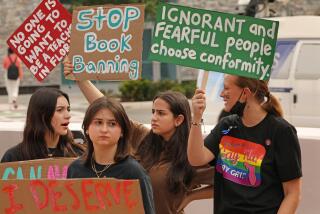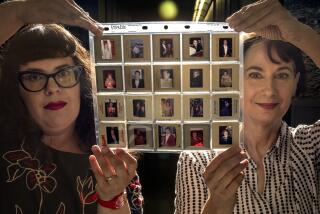Preserving History of U.S. Women : Schlesinger Library Basement Archive Grows Up--and Out
- Share via
CAMBRIDGE, Mass. — It was started by accident in 1943.
Today, the Arthur and Elizabeth Schlesinger Library on the History of Women in America is the most comprehensive library of its kind, a remarkable collection of books, papers and film reflecting the social history of women in America.
Among its treasures are the letters of writer Harriet Beecher Stowe, the papers of feminist Betty Friedan and aviator Amelia Earhart and one of the most extensive cookbook collections in the country.
Also in the collection are the personal papers of more than 500 prominent women, files and records of women’s organizations from Colonial times to the present, more than 50,000 still photographs, film and video documentaries, a full spectrum of women’s periodicals and 50,000 books.
By summer, the 45-year-old library at Radcliffe College on the Harvard University campus will expand from one floor to occupy all four stories of what was once the Radcliffe Library. Built in 1907, the red-brick building is undergoing a $3.4-million face lift financed by individuals, foundations and corporations.
The Schlesinger Library is one of 100 units that make up the Harvard University Library, founded in 1638. It is the oldest library in the United States and the largest in the world, containing more than 11 million volumes.
The women’s library is named for historian Arthur M. Schlesinger Sr., who spent three decades teaching at Harvard, and his wife, Elizabeth Bancroft Schlesinger, also a noted historian. Both were students of women’s history and helped develop the collections.
Barbara Haber, curator of books, said the library began “quite by accident” when suffragist Maud Wood Park, an 1898 Radcliffe graduate, donated her personal papers to her alma mater.
For years little attention was paid to the basement archive, which was called the Woman’s Rights Collection. In time, however, the collection grew to contain the papers of Jeannette Rankin, the first woman in Congress; Frances Perkins, President Franklin D. Roosevelt’s Secretary of Labor; and Elizabeth Palmer Peabody, the early promoter of kindergartens.
Also in the collection are 450 letters of anarchist Emma Goldman and the papers of equal rights crusader Susan B. Anthony and Charlotte Perkins Gilman, the leading intellectual of the Woman’s Rights Movement.
Records and files of numerous women’s organizations can also be found, including the National Organization for Women, the League of Women Voters, the National Woman’s Party, the National Consumers League, the New York Women’s Trade Union League, the National Assn. of Commissions for Women and the Women’s Equity Action League.
The Black Women’s Oral History Project, the memoirs of 72 leading black women, is here as are the papers of the Women’s International League for Peace and Freedom, the Home for Aged Women, and Coyote, the San Francisco-based group that works to decriminalize prostitution.
Covering ‘Leading Issues’
“We cast a wide net,” Haber said. “We try to cover both sides of leading issues such as abortion and surrogate motherhood. We do more than collect history; we help create documentation.”
When the feminist movement blossomed in the early 1970s and women’s history courses sprang up on campuses nationwide, the library was inundated with requests for information, Haber noted. (The library is open to the public, but materials do not circulate.)
The library’s cookbook collection, which numbers 5,000 and includes the personal papers and books of Julia Child and M. F. K. Fisher, will be housed in the Julia Child wing when the renovated building opens Aug. 26.
More to Read
Sign up for our Book Club newsletter
Get the latest news, events and more from the Los Angeles Times Book Club, and help us get L.A. reading and talking.
You may occasionally receive promotional content from the Los Angeles Times.










